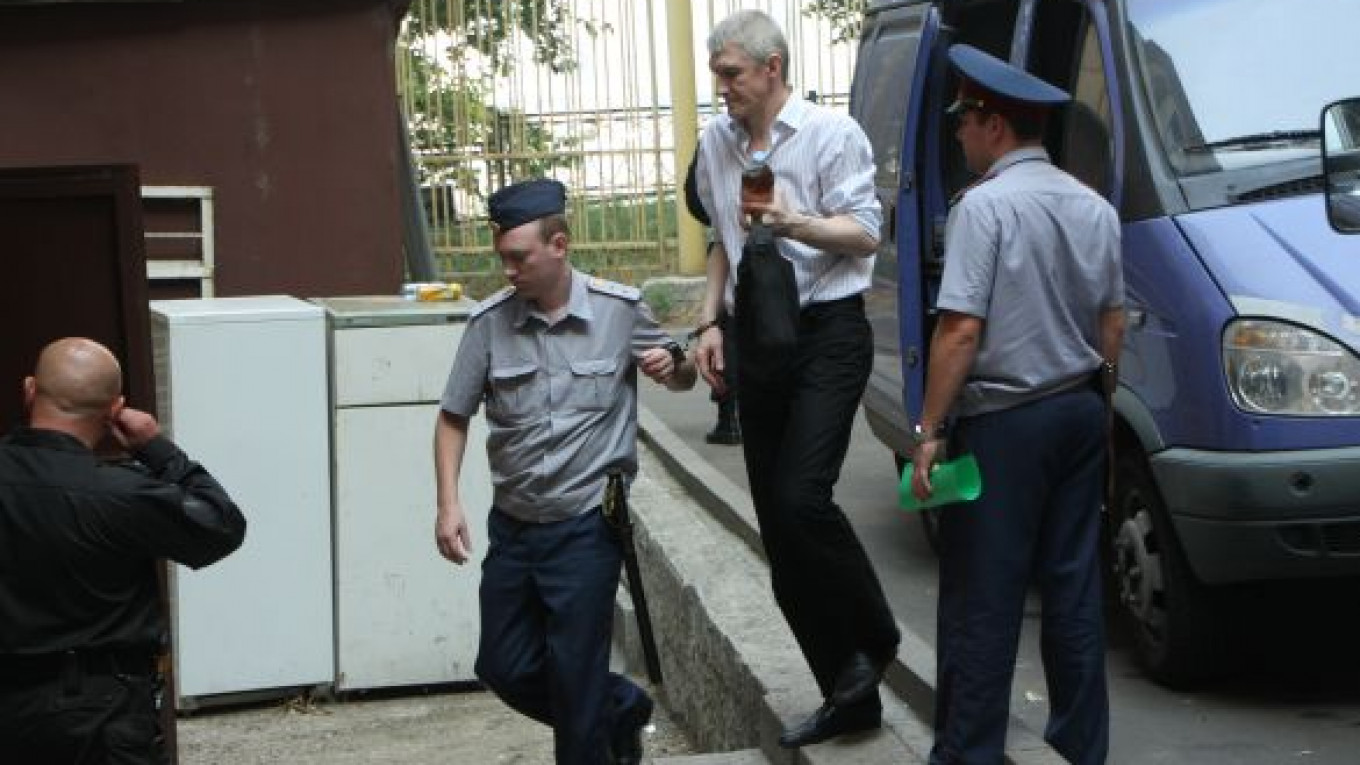Platon Lebedev, the former business associate of Mikhail Khodorkovsky, is to be freed next March under a court ruling that one legal expert called “the end of the Yukos affair.”
A judge in the Arkhangelsk regional city of Velsk on Wednesday reduced Lebedev’s prison sentence by three years and four months, citing changes made to the Criminal Code during Dmitry Medvedev’s presidency that eases the maximum punishment for white-color crimes.
Lebedev is serving a 13-year sentence following his conviction of charges of fraud, tax evasion and embezzlement at two trials, in 2005 and 2010. His supporters say the charges were Kremlin punishment for Khodorkovsky’s political and commercial ambitions.
But the reduced sentence, made on an appeal by Lebedev, does not mean that early release might also be granted to Khodorkovsky, who has not filed a similar appeal and is waiting a court ruling on a challenge to his latest conviction.
The court’s recognition that Lebedev’s punishment was too harsh under current law marks “the end of the Yukos affair,” said Yelena Lukyanova, a Moscow State University law professor who represented Khodorkovsky during his second trial.
Indeed, the apparent softening of the government’s stance toward Lebedev — who was denied parole in July 2011 for supposedly losing a pair of pants — comes as the authorities unleash a legal assault against new challengers to the status quo, including opposition leader Alexei Navalny and the Pussy Riot punk rockers. President Vladimir Putin has faced harsh international criticism for the latest crackdown.
The reduction of Lebedev's sentence is the Kremlin’s way of “achieving balance” in the political system, said Alexei Mukhin, a political analyst with the Center for Political Information.
“The screws have been tightened a little on one side and have been loosened a little on the other side,” Mukhin said.
He was echoed by liberal Novaya Gazeta columnist Andrei Kolesnikov, who said, “The actions of the powers-that-be can be seen as a way to compensate for the [latest] tough measures.”
Lebedev’s court victory is not without precedent. In February, the former deputy director of Yukos’ external debt division, Vladimir Pereverzin, was released from prison early because of a change in legislation. He had been sentenced to 11 years for a conviction of stealing and laundering $13 billion but ended up serving seven years and two months.
Lebedev’s lawyers told reporters that their client would be freed in March 2013 if prosecutors didn’t contest the ruling. Prosecutors, who had asked that the sentence be reduced by one year and nine months, how have 10 days to appeal to the court in Velsk, where Lebedev is imprisoned.
Lebedev, former head of Menatep bank, once the financial locomotive of Khodorkovsky’s Yukos empire, was arrested in July 2003, three months before Khodorkovsky, in what was widely seen as a warning for Khodorkovsky to leave the country for good.
Iosif Diskin, a member of the Public Chamber, said Khodorkovsky should follow Lebedev’s example and appeal for a reduced sentence.
“He pushed the right button through the legal procedures,” Diskin said. “Now it’s up to Khodorkovsky to decide which button to push.”
Wednesday’s ruling came a week after the head of the Supreme Court ordered the Moscow City Court to check whether Lebedev and Khodorkovsky might have been tried twice for the same crime.
Chief justice Vyacheslav Lebedev, who has no relation to the imprisoned businessman, said in a statement that both trials should be seen as one criminal case and defense lawyers could question the legality of the convictions. His decision overturned a rejection by the Supreme Court and sends the case back to the Moscow City Court.
Lebedev's statement was not published on the official Supreme Court site but was posted on Khodorkovky's website.
Khodorkovsky’s lawyer Vladimir Kluvgant said in a statement last week that he doesn't have any “illusions” about the Supreme Court decision other than it indicates that Vyacheslav Lebedev has his “own position” on the case.
Vyacheslav Lebedev, who was recently re-appointed to the Supreme Court post, is seen as a respected figure in the legal community. “He has nothing to lose,” said Lukyanova, the law professor.
How the Moscow City Court might rule remains to be seen, but its judges will take Vyacheslav Lebedev’s position into consideration, said Anna Burdina, a lawyer with the Yukhov, Khrenov and Partners law firm, which is not involved in the legal proceedings.
A Message from The Moscow Times:
Dear readers,
We are facing unprecedented challenges. Russia's Prosecutor General's Office has designated The Moscow Times as an "undesirable" organization, criminalizing our work and putting our staff at risk of prosecution. This follows our earlier unjust labeling as a "foreign agent."
These actions are direct attempts to silence independent journalism in Russia. The authorities claim our work "discredits the decisions of the Russian leadership." We see things differently: we strive to provide accurate, unbiased reporting on Russia.
We, the journalists of The Moscow Times, refuse to be silenced. But to continue our work, we need your help.
Your support, no matter how small, makes a world of difference. If you can, please support us monthly starting from just $2. It's quick to set up, and every contribution makes a significant impact.
By supporting The Moscow Times, you're defending open, independent journalism in the face of repression. Thank you for standing with us.
Remind me later.






